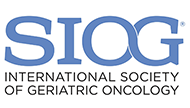Written by Dr. Fay Strohschein, SIOG NAH Governance group member
This year, the Joint SIOG NAH/CANO/EONS session at the SIOG Annual Conference, chaired and organized by Dr. Martine Puts, focused on educating, empowering, and enacting change. Four speakers provided insight into geriatric oncology educational initiatives for nurses
Dr. Sincere McMillan, a nurse practitioner in the Geriatric Medicine Department at the Memorial Sloan Kettering Cancer Center (MSKCC) in the United States, shared her work educating advance practice providers (APP), including nurse practitioners and physician assistants. Referring to their recent study demonstrating that geriatric co-management was associated with 57% lower risk of 90 day mortality after cancer surgery,1 Dr. McMillan highlighted the need to improve these competencies among APP, particularly considering the anticipated lack of geriatricians. To inform APP educational initiatives, they conducted a learning needs survey, assessed feasibility of an APP geriatric oncology education program at MSKCC, and developed a curriculum. They have developed an APP student rotation in inpatient/outpatient geriatric oncology, a Geriatric Oncology Fellowship, and a APP geriatric oncology symposium.
Ms. Soo Jung Kim, also a nurse practitioner in the Geriatrics Service of MSKCC in the United States presented the development of a biennial Geriatric Oncology course for nurses, which began in 2009. This one-day course focuses on topics relevant to the needs of older cancer patients, including health promotion, physiological changes with aging, late effects after cancer treatment, exercise, medication management, cognitive impairment, ethical considerations, and advanced care planning, taught by an interprofessional team. The workshop includes engagement in a complex case to learn comprehensive geriatric assessment (CGA). Using pre, post, and three-month follow-up evaluations, course attendees demonstrated significant increases in knowledge and behaviour change. In 2021, the course changed to a virtual format, providing the opportunity for international attendees.
Dr. Heike Schmidt, Senior Researcher at the Institute for Health and Nursing Science, Martin Luther University Halle-Wittenberg and the Department of Radiation Medicine at the University Hospital Halle (Saale), presented her teams’ work to improve health-related quality of life (HRQOL) of older patients with cancer. They aim to do this by integrating digital HRQOL and patient reported outcome (PRO) assessments into routine care, empower patients in symptom management, and improve shared decision making. Their goal is to combine CGA and HRQOL assessment to provide a holistic picture of the patient. She introduced the new project they are starting to train nurses in CGA and shared decision making, using a hybrid training model including videos and case examples.
I had the privilege of sharing three recent initiatives of the Oncology and Aging Special Interest Group of the Canadian Association of Nurses in Oncology (CANO). The first included educational workshops focused teaching geriatric assessment skills by walking together through the unfolding case of Mr. Smith, an 89-year-old gentleman with squamous cell carcinoma in his left cheek. This was facilitated as both a 40-minute and a 3-hour educational workshop at the annual CANO conference and published as a CME article.2 The second was the collaborative work with the SIOG NAH to develop international3 and Canadian4,5 position statements, informed by roundtable sessions with nurses across Canada. Finally, I presented our current work to develop a geriatric oncology resource toolkit for frontline oncology nurses.
In summary, it was a pleasure to participate in this session that provided insight into a variety of approaches to educating and empowering nurses in geriatric oncology. Discussion highlighted the need to expand these initiatives, and “train the trainers” to facilitate reach of geriatric oncology education for nurses. We look forward to ongoing discussion about how to ensure this education has a broad reach for nurses across cancer and community care.
References
- Shahrokni A, Tin AL, Sarraf S, et al. Association of Geriatric Comanagement and 90-Day Postoperative Mortality Among Patients Aged 75 Years and Older With Cancer. JAMA Network Open 2020;3(8):e209265. doi: 10.1001/jamanetworkopen.2020.9265
- Strohschein FJ, Loucks A, Jin R, et al. Comprehensive Geriatric Assessment: A Case Report on Personalizing Cancer Care of an Older Adult Patient With Head and Neck Cancer. Clin J Oncol Nurs 2020;24(5):514-25. doi: 10.1188/20.Cjon.514-525 [published Online First: 2020/09/19]
- Puts M, Strohschein F, Oldenmenger W, et al. Position statement on oncology and cancer nursing care for older adults with cancer and their caregivers of the International Society of Geriatric Oncology Nursing and Allied Health Interest Group, the Canadian Association of Nurses in Oncology Oncology & Aging Special Interest Group, and the European Oncology Nursing Society. J Geriatr Oncol 2021;12(7):1000-04. doi: 10.1016/j.jgo.2021.03.010
- Strohschein FJ, Newton L, Puts M, et al. Optimizing the care of older Canadians with cancer and their families: A statement articulating the position and contribution of Canadian oncology nurses: Canadian Association of Nurses in Oncology; 2021. Available from: https://www.cano-acio.ca/page/position_statements.
- Strohschein FJ, Newton L, Puts M, et al. Optimiser les soins des adultes âgés atteints de cancer et l’accompagnement de leurs proches : énoncé de position et contribution des infirmières canadiennes en oncologie. Canadian Oncology Nursing Journal / Revue canadienne de soins infirmiers en oncologie 2021;31(3):6. [published Online First: 2021-07-22]



Leave A Comment
You must be logged in to post a comment.